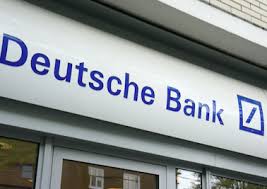Deutsche Bank Settles Two OFAC Cases Totaling $583K for Violations of Ukraine-Russia Sanctions

Deutsche Bank continues to have its problems – legal, compliance and reputational. Now, we can add OFAC sanctions compliance to the list of Deutsche Bank’s troubles.
Deutsche Bank settled two separate matters with OFAC – one involving the processing of a large transaction connected to IPP Oil Products (Cyprus) Ltd, a Specially Designated National, and another for 61 transactions involving Open Joint Stock Company Krasnodar Regional investment Bank, aka Krayinvestbank, another Specially Designated National.
IPP Oil Products Violation
Deutsche Bank agreed to pay $157,500 for its conduct of a $28 million transaction involving IPP Oil Products as part of a series of related transactions. While the payment instructions did not specifically identify IPP Oil, the payment was related to a series of purchases of fuel oil that involved IPP Oil.
Before the transaction occurred, US counsel for IPP Oil represented to Deutsche Bank that IPP Oil’s interest in the transaction no longer existed. Notwithstanding this representation, OFAC cited Deutsche Bank for its failure to conduct due diligence to corroborate the US counsel’s representation concerning IPP Oil’s lack of interest in the transaction. OFAC subsequently determined that IPP Oil nonetheless had an interest in the transaction. Deutsche Bank incorrectly relied on verbal assurances from US Counsel concerning IPP Oil’s status under OFAC sanctions.

In reaching this settlement, OFAC reiterated that financial institutions should take a risk-based approach to sanctions compliance. Given the size of the transaction and the fact that Deutsche Bank knew that prior transactions involved IPP Oil, OFAC expected Deutsche Bank to corroborate independently the representations it had received concerning IPP Oil’s sanctions status.
Krayinvestbank Violations
Separately, Deutsche Bank agreed to pay $425,600 for processing 61 payments to Krayinvestbank a SDN under the Ukraine-Russia sanctions program.
Between December 22 and December 30, 2015, Deutsche Bank processed 61 transactions totaling $276,742.90 destined for Krayinvestbank. Despite the fact that each payment included the applicable SWIFT Business Identifier Code, Deutsche Bank’s screening system failed to identify the transactions because it failed to include Krayinvestbank’s SWIFT BIC when it added the bank’s information to its interdiction filter. In addition, at the time of the transactions, Deutsche Bank’s filter was calibrated to flag only those transactions with an exact SDN match.
Deutsche Bank did not voluntarily disclose either of these enforcement matters.

To remediate its compliance program, Deutsche Bank agreed to maintain robust compliance procedures, including regular risk assessments, internal controls tailored to its risk assessment and profile and OFAC sanctions training.
Deutsche Bank has stated that since 2015, the bank has tripled the size of its global anti-financial crime team, which now totals 1,500 employees, and spent nearly $1 billion on enhancing its training, control and compliance processes.















